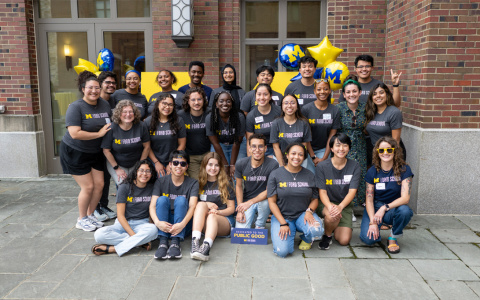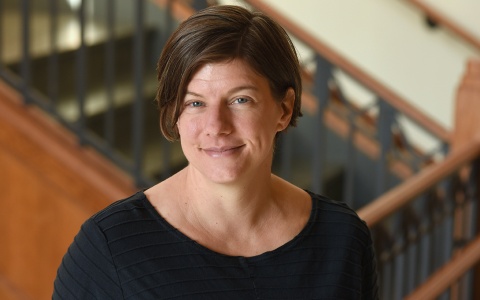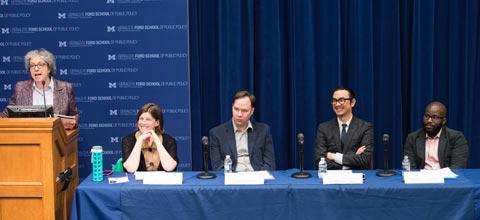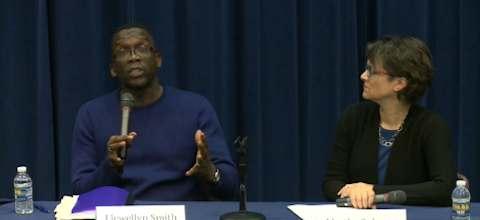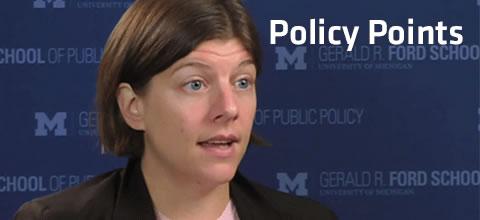Joy Rohde
Joy Rohde is an associate professor of public policy at the University of Michigan's Gerald R. Ford School of Public Policy. She is a historian who works at the intersection of science and technology studies, U.S. intellectual and political history, and the history of U.S. foreign relations.
Rohde is interested broadly in the relationship between science, technology, and state power. Her first book, Armed with Expertise: The Militarization of American Social Research during the Cold War (Cornell, 2013), investigates the Cold War origins and contemporary consequences of the Pentagon’s social research contracting system.
Rohde’s current book project, People of the Machine: Social Science, Computers, and the Cold War Eclipse of Autonomy, is a history of current efforts to manage society and politics with computers. Typical accounts of today’s predictive policy systems locate their roots in recent advances in big data and machine learning technologies. People of the Machine shows that the aspiration to manage politics via computers are rooted Cold War era U.S anxieties and ambitions. Between the 1950s and the 1980s, international relations experts joined forces with computer engineers and government officials in a bid to make political science scientific and foreign policy predictable. But they also worried that their projects ceded too much intellectual autonomy and political agency to machines and recapitulated the racially discriminatory logics of U.S. national security. People of the Machine uses history to deepen and clarify the political and intellectual stakes of contemporary computational governance projects. It shows that the quest to depoliticize behavioral knowledge and public policy through technology has long been an ambivalent political agenda. Beneath debates over racial biases in algorithms and the threat of misinformation posed by generative AI are deep anxieties about experts’ and citizens’ intellectual and political agency in an increasingly fractured and persistently unequal mass polity and international political system.
At Michigan, Rohde directs the Science, Technology, and Society Program and is a faculty affiliate of the Department of History and the Science, Technology, and Public Policy Program.
In 2020-21, Rohde was a Member in the School of Social Science at the Institute for Advanced Study, with support provided by the Carnegie Corporation of New York. Her work has also been supported by the Max Planck Institute for the History of Science and the Jefferson Scholars Foundation National Fellow program.
Educational background
- PhD, History and Sociology of Science, University of Pennsylvania
- MA, History and Sociology of Science, University of Pennsylvania
- BA, Anthropology, University of Chicago
Recent publications
- “Science and the State: Introduction.” With Alondra Nelson, Charis Thompson, Sonja Van Wichelen, Joshua Barkan, Diana Graizbord, and Christo Sims. Public Culture, 35.3 (Sept. 2023): 279-88. https://doi.org/10.1215/08992363-10742439
- “Between Information and Uncertainty: The Cold War Origins of Computational Policy Knowledge.” Public Culture 35.3 (Sept. 2023): 405-16. https://doi.org/10.1215/08992363-10742579
- In The Future of Social Science and National Security, ed. Michael Desch, David Montgomery, and Mathew Burrows. Stimson Center and Carnegie Corporation of New York. March 2023. https://www.stimson.org/2023/politics-ethics-in-the-mobilization-of-soc…
- “Beyond Torture: Knowledge and Power at the Nexus of Social Science and National Security.” History of the Human Sciences 35.5 (2022), 7-26.
- “War.” In Society on the Edge: Social Science and Public Policy in the Postwar United States, ed. Philippe Fontaine and Jefferson D. Pooley (Cambridge: Cambridge University Press, 2021), 358-85.
- “Politics and Ethics in the Mobilization of Social Science for National Security,” Stimson.Org, March 2023.
- “Beyond Torture: Knowledge and Power at the Nexus of Social Science and National Security.” History of the Human Sciences 35.5 (December 2022). doi.org/10.1177/09526951221121733
- “War.” In Philippe Fontaine and Jefferson Pooley, eds., Redrawing the Boundaries of the Social Sciences: How Social Problems Became Economic Problems in the Postwar U.S., Cambridge University Press, 2020. https://osf.io/preprints/socarxiv/dxa92/
- “War.” In Philippe Fontaine and Jefferson Pooley, eds., Redrawing the Boundaries of the Social Sciences: How Social Problems Became Economic Problems in the Postwar U.S., Cambridge University Press, 2020. https://osf.io/preprints/socarxiv/dxa92/
- “Pax Technologica: Computers, International Affairs, and Human Reason in the Cold War.” Isis 108.4 (December 2017): 792-813.
- Social Science and Foreign Affairs.” In The Oxford Research Encyclopedia of American History, ed. Jon Butler (New York: Oxford University Press, November 2015). DOI: 10.1093/acrefore/9780199329175.013.154.


